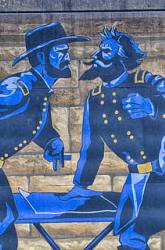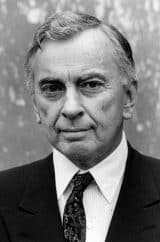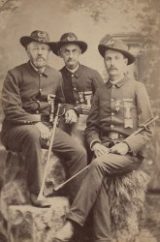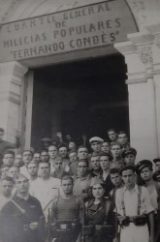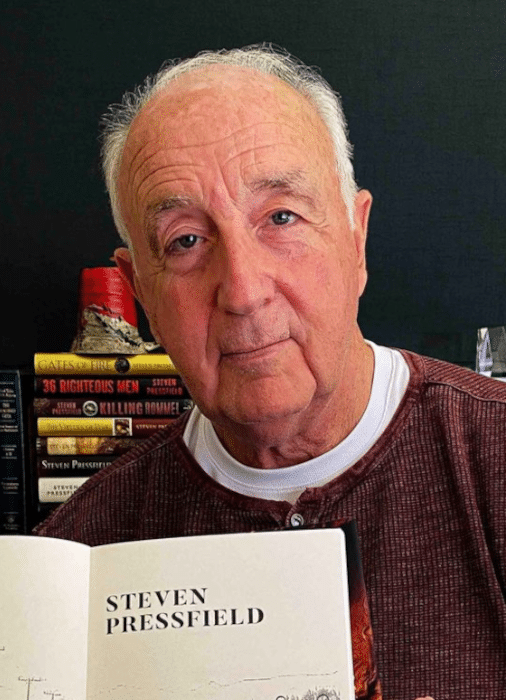 Driven to Write
Driven to Write
Many people have a false idea of a literary career as a linear progression: you begin by writing for your high school newspaper, earn a degree in English or literature, start working as a journalist or intern at a publisher, crank out a few short stories, and then suddenly write a bestselling novel. In many cases, including that of Steven Pressfield, the road to success was far rockier.
He is one of the rare success stories in the world of commercial writing. At one point, he was homeless due to his work simply not selling. Today, he’s worth an estimated $5 million. His work has been translated into multiple languages; he’s surprisingly popular in Greece, where several of his novels are set, as well as Trinidad and Tobago, his birthplace.
Straddles Fiction and Self-Help
His experience as a screenwriter has definitely had an effect on how he approaches storytelling in the written word. Almost any entry on the Steven Pressfield book list could easily be turned into a series of visual scenes of a few minutes each, complete with stage directions.
At the same time, he’s also known for motivational tracts directed especially at people working in creative fields. War of Art, the best Steven Pressfield book on writing and the process of becoming a writer, has sold more than a million copies globally. Here are ten of the most well-received Steven Pressfield books, roughly in order of popularity:
Best Steven Pressfield Books
| Photo | Title | Rating | Length | Buy |
|---|---|---|---|---|

|
Gates of Fire | 9.98/10 | 400 Pages | Check Price On Amazon |

|
The War of Art | 9.92/10 | 194 Pages | Check Price On Amazon |

|
Turning Pro | 9.84/10 | 148 Pages | Check Price On Amazon |

|
The Virtues Of War | 9.78/10 | 368 Pages | Check Price On Amazon |

|
Do the Work | 9.72/10 | 112 Pages | Check Price On Amazon |
Gates of Fire

 Military Fiction for Adults
Military Fiction for Adults
According to the author himself, armed conflict is also a kind of allegory for the struggle each of us faces: financially, internally, and even spiritually. In this sense, this novel is less about spears and shields and more about integrity, teamwork, courage, and fulfilling one’s obligations.
In case you were wondering, Gates of Fire was written and published years before the movie 300 with its outrageous costumes came out. Though there aren’t many reliable historical sources to draw on (only three Spartans survived the battle), the author clearly did his research. More importantly, a good balance between action and psychological exposition makes this one of the best Steven Pressfield novels.
True to Life
Among the many and various odd jobs he did on his path to becoming a commercial success, Pressfield was a marine during the height of the Vietnam war. He was never in a firefight, though, hated the experience in general, and is for the most part a stranger to the gung-ho-but-only-from-a-distance militarist cheerleading that permeates much of American society. (If you don’t know what I’m talking about, reading a couple of books by Gore Vidal may help.)
Yet Gates of Fire quickly became one of the most popular Steven Pressfield books. It is widely praised for its realism by people who have experienced combat, and is in fact required reading at several military academies. Building on this success, the author followed up with several other historical military novels.
The War of Art

 The Tao of Art
The Tao of Art
As is subtly implied in many of the best historical novels by Steven Pressfield, victory in any kind of fight is only the eventual manifestation of a more profound internal struggle. Much the same, he argues, can be said about success in any kind of endeavor.
His own journey to becoming a successful novelist and non-fiction writer was far from smooth, and he’s open about just how hard it was for him and how many mistakes he made along the way. As he points out in The War of Art, harsh criticism, poor sales, and rejection letters are part of life – George Orwell and J. K. Rowling experienced these too. What really matters is overcoming your own inertia.
Some Good Advice, Some Bad
Artistic creativity is a very personal thing. Just because Steven Pressfield, or Martin Amis for that matter, overcame creative blocks in particular ways doesn’t mean that you should try them.
As a kind of introspective book, much of what Pressfield recommends just isn’t applicable to most people, or perhaps anybody but himself. A lot of what he claims, especially the links he draws between procrastination and ill health, sounds very cultlike and indeed plain wrong. On the other hand, his no-nonsense, no-excuses tone does make this and its sequels, Turning Pro and Do the Work, some of the best books by Steven Pressfield (or anyone else for that matter) to read if you find yourself spending more time dreaming about being creative rather than just sitting down and doing it.
Turning Pro

 Putting in the Hours
Putting in the Hours
In The War of Art and Do the Work, Pressfield rages against procrastination as the root of practically all evil. By the end of this, Steven Pressfield’s latest book on the topic, you’ll probably agree with him at least a little. Still, how are you supposed to defeat this enemy of creativity other than through sheer willpower?
One of the key messages of Turning Pro, like Deep Work by Cal Newport, is that we’re all inclined to waste time on unproductive activities while telling ourselves that we’re actually busy. Instead, eliminating distraction is one of the first steps in becoming a true professional artist instead of an occasional dabbler.
The Rewards of Hard Work
Inspiration is something to actively pursue: if you simply wait for it, you’ll probably be waiting for quite a while. Becoming a professional creator, whether that means in painting, fiction, commercial art, or whatever, necessarily involves making sacrifices. Those who are willing to do so have a good chance of succeeding; those who don’t will at best remain amateurs.
All in all, this book doesn’t offer much that you won’t find in its two companions, as many Steven Pressfield book reviews are happy to point out. Some of the personal anecdotes and ideas are new, but the main intention of Going Pro doesn’t seem to be telling you what you already know. Instead, it offers encouragement – not inspiration – to start doing what you know you should be.
Alexander: The Virtues Of War

 A Darn Good Yarn
A Darn Good Yarn
I love historical novels: since the plots aren’t made up (however unfamiliar they may be), there’s no question of them being unrealistic or contorted into proving some kind of point. Instead, writers like Walter Isaacson can spend their energy on examining the identity, motives, and internal struggles well-known figures of the past may have faced.
Drawing reasonable conclusions about these points naturally requires a great deal of research. This could easily result in a story that’s far from inspiring or one that pedantically struggles from one historical milestone to the next. Fortunately, like in all the top Steven Pressfield books, this isn’t the case with The Virtues of War: the prose flows sleekly and the pacing is immaculate.
Morals of a Different Age
This book takes the form of a first-person narration by its subject, Alexander the Great. It places a heavy focus on the details of military tactics and leadership. This may be due to the popularity of his historical novels among military personnel and enthusiasts, or perhaps simply because that’s what would have been important to the lifelong general himself.
The “virtues” alluded to in the title aren’t all about disciplined brutality. However, though Pressfield probably makes some accommodation to modern sensibilities, Alexander still comes across as something of a barbarian. The reader should really remember that all men are products of their time: they are remarkable mostly for how far they can rise above their environment.
Do the Work

 The Only Antidote to Creative Blocks
The Only Antidote to Creative Blocks
The difference between a Da Vinci and Bob who lives next door to you isn’t necessarily a matter of raw talent. There’s a good chance that it’s not even a lack of resources or training. Every person who works hard at a creative skill isn’t successful, of course – but those who don’t work hard are really just clinging to a pipe dream.
Much the same applies to learning a new skill, starting a business, and almost any worthwhile activity you can think of. This isn’t exactly earthshaking news, especially to anyone who’s read Turning Pro or The War of Art. So, if it’s common knowledge, why aren’t more people succeeding left and right?
Overcoming Resistance
Pressfield calls this mysterious obstacle “resistance”, a catch-all term for all the internal pressures and doubts that prevent us from reaching our full potential. Some people never even make a start on bringing their vision to life, intimidated by how much work they’re letting themselves in for. Others abandon projects when they’re nearly finished, fearing failure and rejection. The specific manifestation doesn’t matter, it’s all “resistance” in one form or another.
Aside from the motivational and entertaining content, the premise of all of these best-selling Steven Pressfield books is pretty much summed up in the title: do the work. As Jocko Willink also says with only a minor change in emphasis, the key is to get going, develop the right habits, and then keep working until you’re done.
The Warrior Ethos

 Lessons from Soldiers Past and Present
Lessons from Soldiers Past and Present
While The Virtues of War may not hold much interest for people not interested in military history, some of the thoughts expressed in it (and in fact all of Steven Pressfield’s best historical books) are applicable to everyone. Each of us faces challenges comparable to those of soldiers, whether ancient or modern.
While you may not have to face the risk of physical harm as part of your job, conflict is almost a certainty. The internal obstacles of fear and self-doubt are universal, regardless of whether you’re speaking up to your sergeant or an obstreperous client. Your workplace probably doesn’t have several pages of uniform regulations, but presenting yourself in the best way possible rarely does any harm.
Good as a Gift
The difference is that certain values are mandatory or at least highly prized in the military, whatever era we’re talking about. The consequences of mistakes are also often more immediate and severe. The anecdotes and quotations from soldiers throughout history therefore apply to all of us in daily life, at least in the way Pressfield fleshes them out.
You won’t, however, see Steven Pressfield’s books ranked on any philosophical forum. The Warrior Ethos is meant to inspire and perhaps point people in the right direction, but it’s pretty vague and rarely deep. If you want to read something in a similar format that will actually make you think, Lives of the Stoics by Ryan Holiday is probably a better choice.
The Afghan Campaign

 A Timeless War Story
A Timeless War Story
You could be forgiven, after only looking at the title, that this novel is about the war of 2001 to 2021. The subject matter of The Afghan Campaign is not quite that recent: instead, it tells the story of the Greek incursion more than two millennia ago.
A major theme in many of the best-rated Steven Pressfield books is that the causes, circumstances, and technology of war change, but the people who fight in them do not. Unlike The Virtues of War covering the same era, this novel is narrated from the point of view of an ordinary foot soldier, who in many ways resembles a modern private.
A Clash of Cultures
330 BCE was far from the last time loosely organized, poorly equipped Afghan warriors gave a major military power endless grief. The reasons for this are extensively examined in The Afghan Campaign and often resonate with modern analyses of more recent wars. Considering that it was written after the invasion of 2001, it may well have been meant as a warning.
Both the organized, Western Greeks and the fiercely tribal, individualistic Afghans are treated fairly: each culture is equally brutal. The descriptions of carnage are often difficult to read, though the author makes up for this with a mixture of expert storytelling and psychological insight into the mind of a warrior.
Killing Rommel

 Authentic and Honest
Authentic and Honest
One of the author’s great strengths as a novelist is the ability to capture the essence of different eras and cultures. Steven Pressfield’s new book, for instance, is set in 1st-century Jerusalem. He is occasionally accused of making mistakes when it comes to historical details, especially when it comes to times long gone by about which relatively little is known for certain. Even so, he does get the big picture and the overall spirit of the age right more often than not.
Regarding the Second World War and specifically the commandos of the Long Range Desert Group in North Africa, he had access to a wealth of information, from personal letters to academic research. He distilled these into an immersive tale of how the British, on the back foot and well on their way to being defeated, use guile and daring where brute force failed.
Somewhat Slow
Much of the story consists of the protagonist and his comrades racing from one spot in the desert to another, without much of anything happening. Of course, this is entirely realistic, as is the motley assortment of characters drawn from different cultures.
The main theme of this novel could be said to be how the protagonist, who narrates the story in the first person, grows and develops as his personal war drags on. There’s also plenty of action to be found. Overall, though, the decision to remain absolutely faithful to historical events slows this book down considerably. If you’d prefer a more lively book, the best Steven Pressfield novel for you may be The Profession.
Tides of War

 A Tale of Two Cities
A Tale of Two Cities
Ancient Athens and Sparta are often held up as political archetypes of, respectively, intellect and force. Of course, real events and the people who shaped them show this to be simplistic.
Similarly, it’s naive to expect heroes to be virtuous all of the time – generals and politicians are just as prone to feet of clay as anyone, if not more so. Pressfield realizes this. In both The Virtues of War and The Afghan Campaign, he presents Alexander the Great as someone worthy of admiration but also contempt in other respects.
More History than Fiction
Covering a period of three decades and narrated primarily as the recollections of a person who was involved in major events, though on the sidelines, many readers will find Tides of War to be somewhat tedious. The sequence of events is certainly complicated, while the motivations of each character aren’t always spelled out in detail.
Anyone who’s studied history, however, will understand that the past is always complex: the stripped-down version you find on Wikipedia (or, for contemporary events, in newspapers) is so far simplified as to mislead as much as it informs. If you prefer to see a more intricate, sophisticated rendition of what happened, you’re sure to enjoy this book.
The Legend of Bagger Vance

 Read, Don’t Watch
Read, Don’t Watch
There have been a number of wonderful allegories for spiritual and personal growth over the years. The road trip in Zen and the Art of Motorcycle Maintenance certainly counts, as does flying in Richard Bach’s novels. The game of golf is a new one for me, though.
The Legend of Bagger Vance is frequently thought of as Steven Pressfield’s best book due to the movie made from it. That’s hardly fair, though: the two genres are totally different animals (just think of how The Time Traveler’s Wife was butchered). Though usually lucrative for the author, a novel being chosen as the basis for a film doesn’t mean that it’s either good or bad.
Simple and Heartwarming
Thankfully, you don’t have to know much about golf to understand this book. As in many of the best Steven Pressfield books, it’s really just a physical metaphor for personal struggles and journeys.
Though based on the Hindu Bhagavad Gita, this novel isn’t religious in the conventional sense nor difficult to read. In fact, it’s hard to put down, even though it only covers a single, extended game of golf.
Final Thoughts
Steven Pressfield is, above all, a craftsman. Through long and painful experience, he’s developed a kind of formula that he manages to apply to historical fiction set in various eras with consistent success. Nor do these books read like carbon copies of one another: Pressfield is enough of a thinker and student of human nature to give each a unique theme and emphasis.
He’s also established himself as a kind of mentor. Through books like Nobody Wants to Read Your Sh!t, he helps budding writers and artists avoid the mistakes he made. Of course, while Steven Pressfield’s novels are consistently highly regarded, reviews of his self-help works are mixed. You can certainly admire his versatility without having to enjoy books in both genres.
Michael Englert
Michael is a graduate of cultural studies and history. He enjoys a good bottle of wine and (surprise, surprise) reading. As a small-town librarian, he is currently relishing the silence and peaceful atmosphere that is prevailing.
